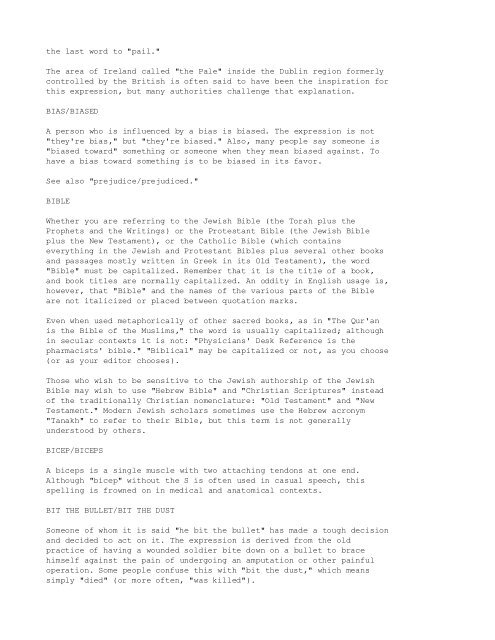Common_Errors_in_English_usage
Common_Errors_in_English_usage
Common_Errors_in_English_usage
Create successful ePaper yourself
Turn your PDF publications into a flip-book with our unique Google optimized e-Paper software.
the last word to "pail."<br />
The area of Ireland called "the Pale" <strong>in</strong>side the Dubl<strong>in</strong> region formerly<br />
controlled by the British is often said to have been the <strong>in</strong>spiration for<br />
this expression, but many authorities challenge that explanation.<br />
BIAS/BIASED<br />
A person who is <strong>in</strong>fluenced by a bias is biased. The expression is not<br />
"they're bias," but "they're biased." Also, many people say someone is<br />
"biased toward" someth<strong>in</strong>g or someone when they mean biased aga<strong>in</strong>st. To<br />
have a bias toward someth<strong>in</strong>g is to be biased <strong>in</strong> its favor.<br />
See also "prejudice/prejudiced."<br />
BIBLE<br />
Whether you are referr<strong>in</strong>g to the Jewish Bible (the Torah plus the<br />
Prophets and the Writ<strong>in</strong>gs) or the Protestant Bible (the Jewish Bible<br />
plus the New Testament), or the Catholic Bible (which conta<strong>in</strong>s<br />
everyth<strong>in</strong>g <strong>in</strong> the Jewish and Protestant Bibles plus several other books<br />
and passages mostly written <strong>in</strong> Greek <strong>in</strong> its Old Testament), the word<br />
"Bible" must be capitalized. Remember that it is the title of a book,<br />
and book titles are normally capitalized. An oddity <strong>in</strong> <strong>English</strong> <strong>usage</strong> is,<br />
however, that "Bible" and the names of the various parts of the Bible<br />
are not italicized or placed between quotation marks.<br />
Even when used metaphorically of other sacred books, as <strong>in</strong> "The Qur'an<br />
is the Bible of the Muslims," the word is usually capitalized; although<br />
<strong>in</strong> secular contexts it is not: "Physicians' Desk Reference is the<br />
pharmacists' bible." "Biblical" may be capitalized or not, as you choose<br />
(or as your editor chooses).<br />
Those who wish to be sensitive to the Jewish authorship of the Jewish<br />
Bible may wish to use "Hebrew Bible" and "Christian Scriptures" <strong>in</strong>stead<br />
of the traditionally Christian nomenclature: "Old Testament" and "New<br />
Testament." Modern Jewish scholars sometimes use the Hebrew acronym<br />
"Tanakh" to refer to their Bible, but this term is not generally<br />
understood by others.<br />
BICEP/BICEPS<br />
A biceps is a s<strong>in</strong>gle muscle with two attach<strong>in</strong>g tendons at one end.<br />
Although "bicep" without the S is often used <strong>in</strong> casual speech, this<br />
spell<strong>in</strong>g is frowned on <strong>in</strong> medical and anatomical contexts.<br />
BIT THE BULLET/BIT THE DUST<br />
Someone of whom it is said "he bit the bullet" has made a tough decision<br />
and decided to act on it. The expression is derived from the old<br />
practice of hav<strong>in</strong>g a wounded soldier bite down on a bullet to brace<br />
himself aga<strong>in</strong>st the pa<strong>in</strong> of undergo<strong>in</strong>g an amputation or other pa<strong>in</strong>ful<br />
operation. Some people confuse this with "bit the dust," which means<br />
simply "died" (or more often, "was killed").





